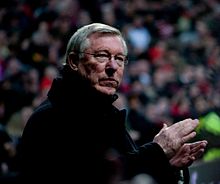Fergie Time
Fergie Time ( English Fergie time , Ferguson's time in the figurative sense) is a derisive term for delayed players when top teams are behind.
background
The name goes back to Alex Ferguson , who coached Manchester United from 1986 to 2013 . Ferguson was known for putting referees under pressure, which also cost him significant fines and bans.
Effects
According to statistical analyzes, Manchester United got significantly more stoppage time in the second half of the game when the team was behind, especially at home games. The expression itself has been known since at least 2004. The newspaper The Times considers the effect based on a statistical analysis of measurable, but leads to other causes.
An analysis of the English Premier League games between 2010 and 2012 by Opta Sports showed that games lost by Manchester United were played 79 seconds longer than usual. However, such effects are known and measurable with other top teams, even if not to the same extent as with Manchester United.
The Fergie Time was in German speaking countries, among others, in a report in the Neue Zürcher Zeitung in 2012 in a derby against Manchester City in 2012, which Manchester United but in a normal stoppage time with 4: 3 addressed chose for themselves.
The Fergie Time is by some journalists as the British equivalent of the Bavaria-Dusels referred. In a direct comparison at the 1998/99 UEFA Champions League final in Barcelona, Manchester United managed to beat Bayern 2-1 with two goals in stoppage time after they had led by an early opening goal up to the 90th minute.
Ferguson himself commented on this in his autobiography:
"Tapping my watch was another psycho-scam. I didn't pay close attention to the time when I played. I kept an eye on the clock, but it was never too difficult to work out how long the extra time would take due to an interruption . (...) It was about the effect that had on the other team, not on our own. When the opponents saw me tap and gesticulate my watch, they got tingly. (...) When ours Opponents saw how I pointed to my watch, they got the feeling that they had to defend themselves against us for a period of time that seemed like an eternity. " - Alex Ferguson
Delegated Use
At the originally planned end of Ferguson's coaching career in 2012, local rivals Manchester City won the Premier League title with a goal in the 94th minute, whereupon the City fans sang: "We won the league / On Fergie time". Ferguson extended what was known as his personal Fergie Time for another year, and ended 2013 by winning the championship.
Individual evidence
- ↑ Chris Wheeler: I did pressure officials into giving me 'Fergie Time' admits retiring legend Ferguson. In: Daily Mail , May 16, 2013.
- ↑ a b c Charlotte Pritchard: Fergie time: Does it really exist? . BBC News. November 23, 2012. Retrieved September 20, 2013.
- ^ Sam Wallace: Wiley's time-keeping hands United lifeline . In: The Daily Telegraph , August 30, 2004. Retrieved September 20, 2013.
- ↑ Sadie Gray: It's a fact! Fergie time does exist in the Premier League . In: The Times , October 24, 2009. Retrieved February 21, 2010.
- ↑ Manchester United wins derby. Without “Fergie Time”. In: NZZ , December 10, 2012.
- ↑ Philip Olterman: Bayern Munich are the club Germans love to hate, Borussia Dortmund will have most neutrals on their side, and for good reason - the match is as much about politics as football. In: theguardian.com , May 25, 2013.
- ↑ Alex Ferguson: My Autobiography . ISBN 978-3-8419-0273-3 , pp. 280 .
- ↑ Christian Eichler: Eichler euro Goals. And "Fergie Time" is over forever. But there is always stoppage time somewhere. From Manchester to Dortmund to Wigan and Watford. Crazy last seconds in Eichler's Eurogoals. In: FAZ , May 13, 2013.
